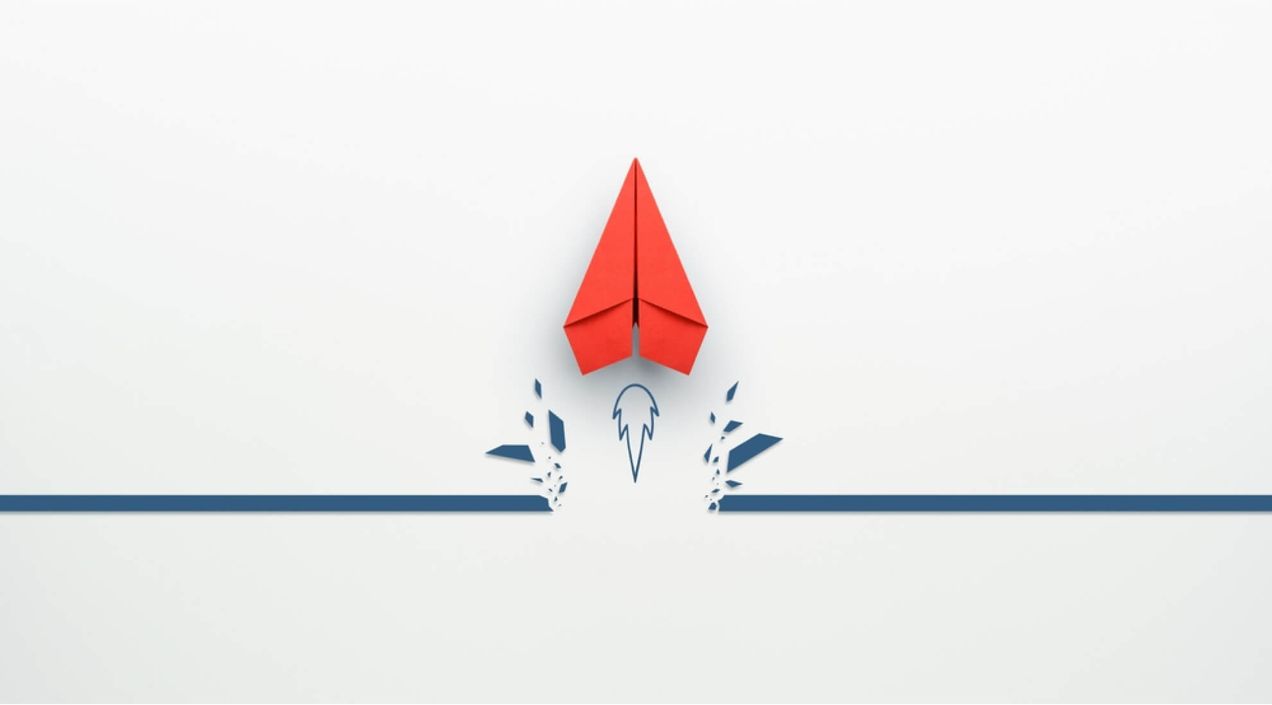50+ Best leadership games for employee skill development

Ever hosted a dinner party where half the guests show up early, one forgets the wine, and someone brings a plus-one you didn’t expect? Amid the clatter of serving spoons and Spotify debates, there’s always that one person who quietly takes the reins—rearranging chairs, calming the overcooked pasta panic, and somehow getting everyone laughing by dessert.
That, right there, is leadership in action. Not with a title or a meeting invite, but with presence, clarity, and just the right amount of improvisation. Leadership games tap into that same energy. They’re not just fun exercises—they’re tiny, high-reward simulations that reveal who leads with empathy, who thrives under pressure, and who turns group chaos into harmony.
So, whether you’re managing a team or planning the next potluck, leadership games might just be your secret ingredient.
Blog Highlights


What are leadership games?

Leadership games are interactive activities designed to enhance leadership skills, foster team collaboration, and develop problem-solving abilities. These games provide experiential learning opportunities that allow participants to practice and refine leadership qualities in a safe and engaging environment. Often used in team-building workshops, seminars, and corporate training sessions, leadership games aim to simulate real-world scenarios and challenges that leaders might encounter.
These games vary in format and complexity, encompassing both physical and mental challenges. They can include role-playing simulations, strategic decision-making exercises, communication challenges, and problem-solving scenarios.
Leadership games are carefully designed to encourage participants to think critically, communicate effectively, make decisions under pressure, and work collaboratively to achieve a common goal. Leadership games offer a dynamic approach to leadership development, engaging participants and providing insights into their leadership styles and strengths.
These experiential leadership activities help participants gain self-awareness, improve interpersonal skills, and practice effective decision-making—all essential components of effective leadership.
What is leadership skill development?

Leadership skill development refers to the intentional and systematic process of enhancing the abilities, traits, and competencies that contribute to effective leadership. It involves acquiring, honing, and refining a range of skills that empower individuals to guide, inspire, and influence others toward achieving shared goals.
Leadership skill development recognizes that effective leadership is not solely an innate trait but a skill set that can be learned, practiced, and improved over time. Without these skills, the consequences can be costly—25% of organizations experience profit loss due to ineffective frontline leaders.
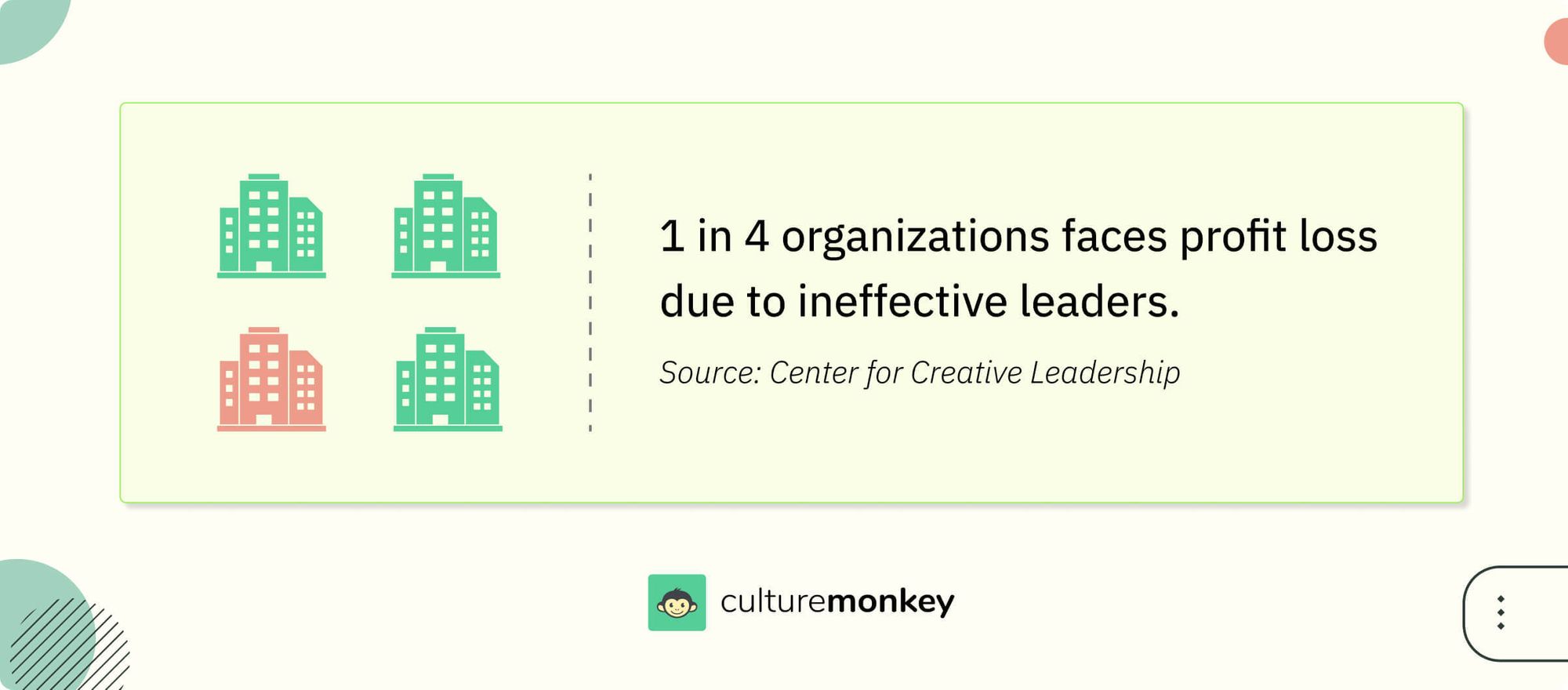
Key components of leadership skill development include:
- Communication: Effective leaders are adept communicators, both in conveying their vision and in actively listening to others. Developing skills in verbal and nonverbal communication helps leaders build strong relationships and foster understanding among team members.
- Emotional intelligence: Leaders with high emotional intelligence can understand and manage their own emotions while empathizing with and influencing the emotions of others. This skill is vital for creating a positive and productive work environment.
- Decision-making: Leaders often face complex decisions. Developing strong decision-making skills for a good leader involves analyzing information, considering various perspectives, and making well-informed choices that align with organizational goals.
- Problem-solving: Leaders must navigate challenges and find innovative solutions. Developing problem-solving skills enhances a leader's ability to address issues, identify root causes, and implement effective solutions.
- Adaptability: In today's dynamic world, leaders must be adaptable to change. Developing this skill involves embracing flexibility, openness to new ideas, and the ability to lead during times of uncertainty.
- Conflict resolution: Leaders who can manage conflicts constructively create harmonious work environments. Developing conflict resolution skills includes active listening, negotiation, and finding win-win solutions.
- Motivation: Inspiring and motivating team members is a key leadership skill. Leaders who can understand individual and collective motivations can create a high-performing team.
- Delegation: Effective leaders know when and how to delegate tasks to team members based on their strengths and expertise. Developing delegation skills empowers team members and maximizes efficiency.
- Time management: Leaders must manage their time efficiently to balance various responsibilities. Developing time management skills for a great leader involves setting priorities, organizing tasks, and maintaining productivity.
- Influence and persuasion: Leaders often need to influence others to support their vision. Developing these skills includes understanding different persuasion techniques and adapting them to specific situations.
- Team building: Effective leadership involves fostering a sense of unity and collaboration within a team. Developing team-building skills helps leaders create a cohesive group that works well together, enhancing overall productivity and morale.
- Visionary thinking: Great leaders are often visionary thinkers who can see the bigger picture and set long-term goals. Developing this skill involves cultivating the ability to anticipate future trends, plan strategically, and inspire others to work towards a shared vision.
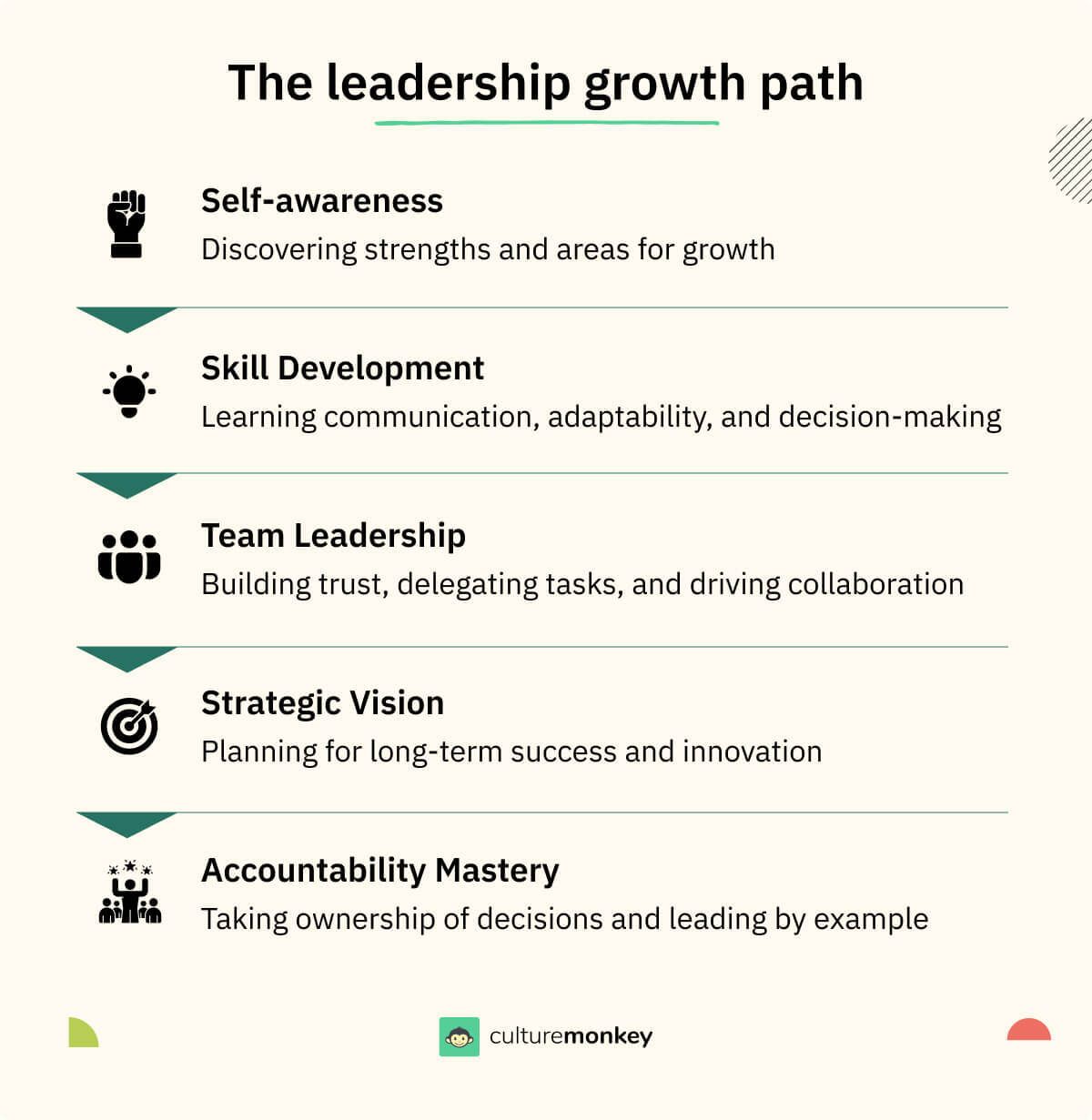
By investing in leadership skill development, individuals can enhance their ability to lead effectively, drive organizational success, and positively impact their teams and workplaces.
Types of leadership activities
Leadership activities are crucial in shaping effective leaders by enhancing their skills, fostering team cohesion, and promoting strategic thinking. Various types of leadership activities can be utilized to achieve these goals. Below are seven effective ways to engage in leadership activities:
Workshops and seminars
Leadership workshops and seminars are structured sessions that focus on developing specific leadership skills. These events can cover a wide range of topics such as communication, decision-making, conflict resolution, and strategic planning. They often include expert speakers, interactive discussions, and practical exercises, providing a comprehensive learning experience.
Mentorship programs
Mentorship programs pair less experienced individuals with seasoned leaders to provide guidance, support, and knowledge transfer. These relationships foster personal and professional growth, offering mentees valuable insights into leadership practices, while mentors refine their own leadership and coaching skills.
Team-building exercises
Team-building activities are designed to enhance collaboration, communication, and trust among team members. Examples include trust falls, collaborative problem-solving tasks, and outdoor adventure challenges. These exercises help leaders understand team dynamics, improve interpersonal skills, and build stronger, more cohesive teams.
Role-playing scenarios
Role-playing activities involve participants acting out specific leadership scenarios to practice and develop their skills in a controlled environment. These scenarios can range from handling a difficult employee to managing a crisis situation. Role-playing helps leaders gain confidence, improve their decision-making abilities, and receive constructive feedback in a safe setting.
Leadership retreats
Leadership retreats take participants out of their usual work environment to focus intensively on leadership development. These retreats often include workshops, team-building exercises, strategic planning sessions, and opportunities for reflection. The immersive nature of retreats allows for deep learning and personal growth.
Simulation games
Simulation games replicate real-world challenges and require participants to navigate complex situations, make strategic decisions, and solve problems. These games are effective in developing critical thinking, adaptability, and leadership skills under pressure. Examples include business simulations, military strategy games, and crisis management exercises.
Feedback and reflection sessions
Regular feedback and reflection sessions encourage leaders to evaluate their performance, identify strengths and areas for improvement, and set development goals. These sessions can be conducted one-on-one or in groups, and they often involve self-assessment tools, peer feedback, and discussions with supervisors or mentors.
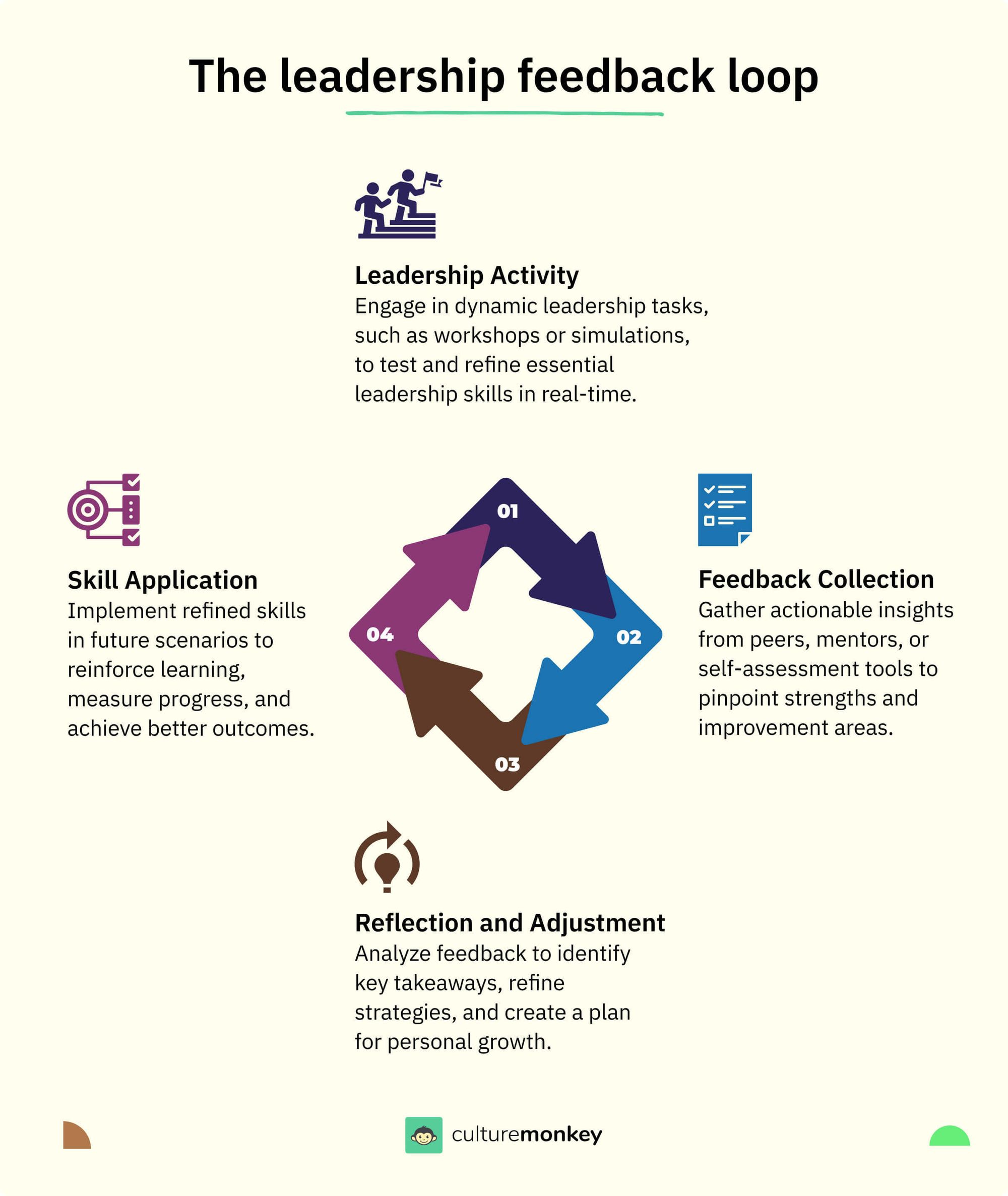
Benefits of leadership activities in the workplace
Integrating structured leadership activities into the workplace leads to stronger teams, better decision-making, and a more engaged workforce.
- Enhances communication and collaboration: Well-designed leadership activity games improve how employees communicate, listen, and work together under various challenges.
- Identifies and develops future leaders: Through hands-on leadership development exercises, managers can spot emerging talent and cultivate essential leadership traits early.
- Improves team morale and motivation: Interactive leadership games for employees create a fun, low-pressure environment that boosts engagement and encourages creative thinking.
- Strengthens problem-solving skills: Strategic leadership games for teams simulate real-world scenarios, allowing participants to practice and refine critical decision-making skills.
- Encourages innovative thinking: Unique leadership game ideas challenge teams to think outside the box, driving innovation while reinforcing core leadership principles.
Common pitfalls to avoid when running leadership games
While leadership games can be highly effective, several common mistakes can limit their impact or disengage participants if not carefully managed.
- Lack of clear objectives: Running leadership training games without defined goals can confuse participants and reduce the value of the experience, leading to wasted time and unclear takeaways.
- Overlooking team dynamics: Ignoring personality differences or team history can lead to disengagement or conflict during leadership activities for workplace sessions, especially if games aren’t tailored appropriately.
- Failing to debrief: Skipping a proper debrief after leadership development games prevents participants from connecting the activity to real-world application, reducing long-term benefits.
- Overcomplicating the game mechanics: Complex rules or vague instructions can frustrate teams and distract from the learning objectives. Keep leadership games for change simple and focused for best results.
- Using the same games repeatedly: Repeating the same activities too often can lead to boredom. Rotate formats with new virtual leadership activities and in-person experiences to maintain engagement.
- Not aligning games with organizational culture: Using games that clash with your company’s values or tone can feel forced. Ensure all leadership development games align with your team's unique work culture and challenges.
What’s the best setting for leadership activities?

Creating the ideal setting for leadership activities is essential to maximize engagement and learning. The environment should foster openness, creativity, and collaboration. Here’s how HR leaders can design the perfect setting:
- In-person vs. Virtual spaces: In-person settings like conference rooms, outdoor venues, or training centers are best for activities requiring physical interaction, such as role-playing or trust-building exercises. While virtual platforms such as Zoom, Miro, or Gather.Town work well for remote teams, enabling activities like virtual escape rooms or brainstorming sessions.
- Comfort and accessibility: Ensure the space is comfortable and inclusive for all participants. This includes ergonomic seating, adequate lighting, and accessibility for individuals with diverse needs.
- Fostering collaboration: Use breakout spaces or small groups for focused discussions and team-building. An intimate setting helps participants feel at ease.
- Relevant resources and tools: Equip the space with tools like whiteboards, projectors, flip charts, or collaborative software to facilitate effective communication and creativity.
- Scheduling for energy and focus: Conduct activities during peak energy hours, avoiding times when employees are likely to feel fatigued.
- Aligning with activity goals: Choose a setting that matches the activity’s purpose. For instance, outdoor environments suit resilience-building exercises, while formal boardrooms work better for strategic problem-solving.
Importance of grooming leaders to create an employee of growth
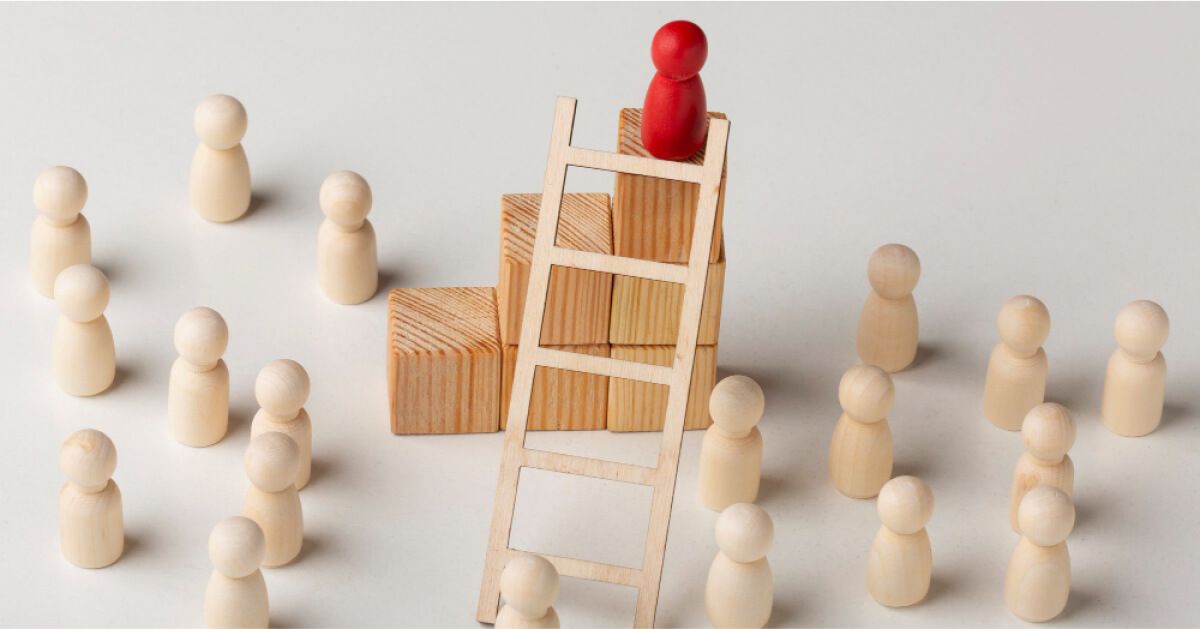
Grooming leaders to foster employee growth is a strategic imperative that underpins organizational success and sustainability. It involves nurturing and developing individuals within an organization to take on leadership roles, guiding and inspiring their teams toward personal and professional growth.
This approach not only benefits employees but also cultivates a culture of continuous improvement, innovation, and adaptability within the organization.
Key reasons for the importance of grooming leaders to create an environment of employee growth include:
- Nurturing talent pipeline: Grooming potential leaders from within the organization creates a steady pool of capable individuals ready to step into higher roles. This approach reduces the need for external recruitment and ensures a seamless transition, preserving organizational knowledge and culture.
- Employee engagement and retention: Employees are more likely to stay with an organization that invests in their development and offers a clear path for growth. Grooming leaders showcase a commitment to employees' professional aspirations, enhancing engagement and reducing turnover.
- Skill enhancement: Groomed leaders undergo comprehensive training and development, honing their skills in communication, decision-making, conflict resolution, leadership activity, and strategic thinking. As these leaders guide their teams, employees benefit from their expertise and mentorship.
- Inspiration and role modeling: Groomed leaders serve as role models for their teams. Their journey from entry-level positions to leadership roles inspires employees, motivating them to set ambitious goals and invest in their growth.
- Effective succession planning: A robust leadership grooming program facilitates effective succession planning. By identifying and preparing potential leaders, organizations are better equipped to handle leadership vacancies without disruption.
- Cultural continuity: Groomed leaders are already familiar with the organization's values, culture, and operations. This familiarity enables them to seamlessly integrate growth opportunities into the existing work environment, fostering cultural continuity.
- Innovation and adaptation: Groomed leaders are equipped to drive innovation and adapt to changing industry landscapes. They instill a culture of learning and experimentation, encouraging employees to embrace new ideas and technologies.
- Enhanced collaboration: Leaders groomed from within are more likely to prioritize collaboration and teamwork. They understand the value of nurturing a supportive environment that encourages knowledge-sharing and mutual growth.
- Customized development plans: Grooming leaders allows organizations to tailor leadership development programs to align with the company's goals and values, ensuring that leaders are equipped to drive growth in a way that resonates with the organization's unique identity.
- Sustained growth: By fostering employee growth through effective leadership, organizations create a virtuous cycle of development. Groomed leaders perpetuate a culture of growth, enabling continuous improvement and long-term success.



I want to invest in our people and I think I will be able to prove that we will lower attrition, raise performance, but most importantly create the kind of company in which people feel part of something larger than themselves.
Chairman Emeritus
Starbucks
In conclusion, grooming leaders to nurture employee growth is a strategic investment that reaps rewards at both the individual and organizational levels. It creates a thriving ecosystem where employees are empowered to reach their potential, and leaders are equipped to drive growth, innovation, and excellence.
This holistic approach not only strengthens the organization's leadership bench but also cultivates an environment where growth is a shared value embraced by all.
Elements of a good leadership activity
A good leadership activity is designed to develop essential skills, foster teamwork, and promote personal growth among participants. The following are the 7 key elements that make a leadership activity effective:
1. Clear objectives
Every leadership activity should have well-defined goals that align with the desired outcomes. Whether the aim is to enhance communication, build team cohesion, or develop strategic thinking, having clear objectives ensures that the activity remains focused and relevant. Clear goals also help participants understand the purpose of the activity and what is expected of them.
2. Engagement and interactivity
Effective leadership activities actively engage participants through interactive elements. This can include discussions, hands-on exercises, role-playing, or group problem-solving tasks. Interactivity keeps participants motivated, encourages collaboration, and provides practical experiences that are more memorable and impactful than passive learning methods.
3. Real-world relevance
A good leadership activity should relate to real-world scenarios that participants are likely to encounter in their roles. By simulating realistic challenges, these activities help leaders develop practical skills that can be directly applied in their work environment. This relevance ensures that the lessons learned are meaningful and immediately useful.
4. Feedback mechanism
Providing feedback is crucial for learning and improvement. Effective leadership activities include mechanisms for giving and receiving feedback, such as debriefing sessions, peer reviews, or self-assessment tools. Constructive feedback helps participants recognize their strengths, identify areas for improvement, and understand different perspectives.
5. Reflective component
Incorporating time for reflection allows participants to internalize their experiences and insights gained from the activity. Reflection can be facilitated through guided discussions, journaling, or personal contemplation. This process helps deepen understanding, promotes self-awareness, and encourages continuous growth.
6. Skill diversity
Good leadership activities address a range of skills rather than focusing on just one aspect of leadership. By incorporating elements that develop communication, problem-solving, emotional intelligence, and decision-making, these activities provide a comprehensive approach to leadership development.
7. Inclusivity
Effective leadership activities are inclusive and consider the diverse backgrounds and experiences of participants. Activities should be designed to accommodate different learning styles, cultural perspectives, and levels of experience. Inclusivity ensures that all participants feel valued and can fully engage in the learning process.
Why is conducting leadership workshops and games at work necessary?
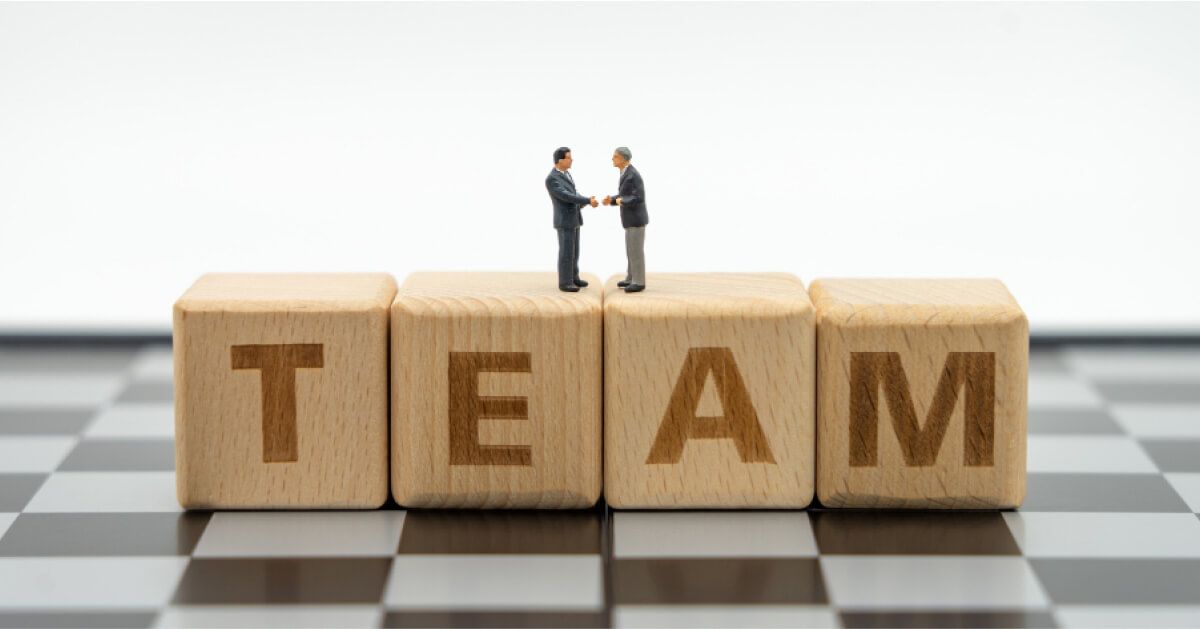
Conducting leadership workshops and games in the workplace is a crucial strategy for fostering effective leadership skills, enhancing team dynamics, and promoting a culture of continuous learning and growth.
These initiatives offer numerous benefits that contribute to individual and organizational success:
- Skill enhancement: Leadership workshops provide structured environments for employees to develop and refine essential leadership skills, such as communication, decision-making, conflict resolution, and emotional intelligence. Interactive games offer hands-on practice that reinforces these skills in real-world scenarios.
- Self-awareness: Workshops often include self-assessment activities that encourage participants to reflect on their strengths, weaknesses, and different leadership styles. This self-awareness is vital for personal growth and effective leadership.
- Team collaboration: Leadership games encourage teamwork and collaboration among participants. These activities simulate challenges that require participants to communicate, strategize, and make decisions collectively, improving team dynamics.
- Problem-solving: Many leadership games present participants with complex problems to solve, fostering critical thinking and innovative solutions. These experiences prepare leaders to tackle challenges with creativity and confidence.
- Adaptability: In today's rapidly evolving business landscape, adaptability is essential. Workshops and games expose participants to diverse scenarios, helping them become more flexible and resilient leaders. Research from Mckinsey & Company shows a 28% increase in revenue over three years among high-tech companies that had established adaptable cultures.
- Confidence building: Successfully navigating leadership challenges in workshops and games boosts participants' confidence in their leadership abilities. This newfound self-assurance translates into improved performance in their actual leadership roles.
- Networking and relationship building: Leadership workshops provide opportunities to interact with colleagues from different departments and backgrounds. These connections can lead to valuable professional relationships and broader perspectives.
- Leadership development pipeline: Workshops help identify individuals with leadership potential. Organizations can then provide targeted leadership training, and opportunities to groom these individuals for future leadership roles.
- Cultural alignment: Workshops can reinforce the organization's values, mission, and culture, ensuring that leaders embody and promote these principles throughout the company.
- Motivation and engagement: Participating in engaging and interactive workshops and games can reinvigorate employees' enthusiasm for their roles, leading to increased motivation and job satisfaction.
- Continuous learning: Leadership workshops and games encourage a culture of continuous learning and personal development. Leaders who continuously update their skills can better adapt to industry changes and lead their teams effectively.
- Conflict resolution: Interactive games often simulate scenarios requiring conflict resolution skills. This practical experience equips leaders with strategies to address conflicts constructively in the workplace.
- Organizational performance: Effective leadership directly impacts organizational performance. Well-trained leaders inspire their teams, improve productivity, and contribute to a positive work environment.
- Retention and employee growth: Providing leadership development opportunities demonstrates an investment in employees' growth and advancement, increasing their loyalty and commitment to the organization.
- Succession planning: Workshops and leadership games help employees develop critical skills, creating a strong pipeline of future leaders. This proactive approach ensures smooth transitions and minimizes leadership gaps within organizations.
- Change management: Leadership training often includes change management modules, equipping leaders to guide teams through transitions effectively. This helps them address resistance, maintain morale, and drive adaptability during organizational changes.
- Employee empowerment: Leadership activities empower employees by fostering ownership, confidence, and decision-making skills. These initiatives create proactive team members, enhance collaboration, and support continuous growth in a dynamic work environment.



When leaders throughout an organization invest real time to understand employees at a fundamental level, they create a climate for greater morale, loyalty, and growth.
Founder
The Table Group
Creating inclusive leadership games for diverse teams
Inclusive leadership games ensure all employees feel valued and can fully participate, regardless of their background or abilities. Here’s how HR managers can design games that foster inclusivity:
- Celebrate Diversity: Use games that acknowledge and celebrate participants’ unique strengths and cultural backgrounds. Avoid activities that rely on cultural references unfamiliar to some participants.
- Accessibility and Adaptability: Design activities that are accessible to individuals with physical disabilities, neurodiverse needs, or language barriers. Utilize tools with accessibility features and adapt physical games for inclusivity.
- Promote Collaboration over Competition: Choose games that encourage teamwork rather than rivalry. For example, group storytelling or collaborative problem-solving tasks.
- Use Universal Themes and Simple Language: Focus on games that highlight universal leadership skills like communication, trust, and empathy. Use clear, simple instructions to break language barriers.
- Encourage Reflection: Incorporate debriefing sessions to discuss lessons learned and how participants can apply these insights to their roles.
50+ Best leadership games to build effective teams and drive growth

Here are 50+ engaging fun leadership games and game ideas that can foster skill development, teamwork, and creativity in the workplace:
- Survival challenge: Divide teams into hypothetical survival scenarios. They must collaboratively prioritize items to survive and justify their choices, emphasizing communication and decision-making skills.
- Leadership poker: Teams discuss and assign values to different leadership traits, then "bet" on their decisions. This encourages discussions about the importance of various leadership qualities.
- Escape room adventure: Organize an escape room challenge where teams solve puzzles and riddles to "escape." This activity promotes problem-solving, collaboration, and strategic thinking.
- Build a tower: Provide limited resources and challenge teams to build the tallest tower within a timeframe. This game enhances teamwork, creativity, and adaptability.
- Reverse brainstorming: Teams brainstorm ideas on how to create a problem rather than solve one. This unconventional approach encourages critical thinking and promotes innovative solutions.
- Decision dilemmas: Present teams with complex scenarios requiring tough decisions. As they discuss and justify their choices, participants enhance their decision-making and ethical reasoning skills.
- Role reversal: Participants switch roles within the team, allowing everyone to experience leadership from different perspectives. This game fosters empathy, understanding, and appreciation for different roles in the leadership journey.
- Communication web: Teams stand in circles and pass a ball of yarn while sharing a leadership lesson or experience. This creates a visual representation of interconnectedness and effective communication.
- Storytelling relay: Teams collaborate to create a cohesive story, with each participant adding a sentence. This game improves communication, creativity, and adaptability as the story evolves.
- Scavenger hunt: Organize a workplace scavenger hunt with leadership-related clues and challenges. This game encourages teamwork, problem-solving, and quick decision-making.
- Leadership charades: Participants act out leadership traits or scenarios without using words. This fun activity enhances nonverbal communication skills and engages creativity.
- Personality profiling: Use personality assessment tools to categorize participants into different personality types. Teams must then collaborate to solve challenges using the strengths of each type.
- Innovation tournament: Teams compete to develop and pitch innovative ideas for a specific challenge. This game promotes creativity, strategic thinking, and effective presentation skills.
- Blindfolded obstacle course: Create an obstacle course and blindfold one team member while the rest of the team provides verbal guidance to navigate through it. This game enhances trust, communication, and teamwork.
- Debriefing circles: After completing a leadership activity or game, gather teams in circles to discuss what they learned, the challenges they faced, and how they can apply these lessons to their work. This promotes reflection, knowledge sharing, and continuous improvement.
- Balloon tower: Provide teams with balloons and tape to build the tallest freestanding tower in a set time. This game encourages creativity, teamwork, and strategic planning.
- Spider web: Create a web of strings in a doorway that teams must pass through without touching the strings. This activity enhances teamwork, strategic thinking, and careful planning.
- Silent line-up: Ask team members to line up according to a specific criterion (e.g., birthdate, height) without speaking. This game fosters nonverbal communication and teamwork.
- Minefield: Set up an obstacle course and have one team member navigate it blindfolded, guided by their teammates' verbal instructions. This activity promotes trust, communication, and leadership under pressure.
- Egg drop challenge: Teams design and build a structure to protect an egg from breaking when dropped from a height. This encourages creativity, problem-solving, and teamwork.
- Jigsaw puzzle race: Provide teams with identical jigsaw puzzles and see who can complete theirs first. This game enhances teamwork, strategy, and time management.
- Speed networking: Set up timed sessions where participants quickly meet and share leadership experiences or challenges. This fosters networking, knowledge sharing, and relationship building.
- Fishbowl discussion: Participants form two concentric circles; the inner circle discusses a leadership topic while the outer circle listens. After a set time, they switch roles. This activity promotes active listening, diverse perspectives, and reflective discussion.
- Values auction: In this leadership game, participants bid with fake money on core values like empathy or accountability. It’s a reflective leadership activity that helps clarify personal leadership priorities. Perfect for leadership development exercises and leadership games for teams.
- Leadership debate: Teams take on opposing leadership styles—like democratic vs. autocratic—and argue their merits. This is a critical thinking-driven leadership game idea that builds communication skills. It is great for leadership games for adults and leadership workshop ideas.
- Hero’s journey: Participants share their personal journey toward leadership in a guided storytelling format. This introspective activity fosters authenticity and clarity in leadership growth. It is ideal for leadership development games and virtual leadership activities.
- What would you do?: Teams tackle tricky ethical dilemmas and explain their leadership decisions under pressure. It develops emotional intelligence and decision-making under ambiguity. Excellent as leadership training games and leadership activities for workplace settings.
- Leadership mad libs: A fun twist on team building, participants fill in the blanks to create hilarious leadership stories. This energizing activity lightens the room while prompting leadership reflection. Perfect as fun leadership exercises and leadership games for employees.
- The delegation game: Players are given fictional roles and must delegate tasks based on team strengths. This sharpens prioritization and trust-building in leadership. An effective leadership training activity for employees and leadership games for managers.
- Build a brand: Teams invent and pitch a new brand, assigning leadership roles and navigating team dynamics. A creative and collaborative activity that showcases leadership styles in action. Great for games for leadership training and activities for leadership.
- Moral compass map: Participants explore leadership decisions using a metaphorical map of values vs. consequences. It’s a compelling exercise in ethical reasoning and foresight. Best used in leadership development games and leadership training games.
- Personality pitch: Each personality type "sells" why they’d make a great leader, using their natural traits. This builds appreciation for diverse leadership styles and inclusive thinking. A must-have for leadership skills activities and leadership games for adults.
- The leadership timeline: Participants map defining leadership moments and reflect on their growth. It’s a personal yet professional journey that promotes self-awareness. Powerful for leadership activity games and examples of leadership activities.
- Tower of trust: Teams answer trust-building questions to earn materials and build a tower. Trust and communication are tested in this strategic team challenge. Perfect for leadership team building games and games for leadership.
- Change management challenge: Mid-task, teams are hit with sudden “change” scenarios to navigate. This tests adaptability and problem-solving under shifting conditions. A top pick for leadership games for change and leadership development exercises.
- Mic drop moments: Each person gives a 1-minute impromptu speech on a surprise leadership topic. This builds clarity, confidence, and fast thinking under pressure. Engaging for leadership games for managers and activities for leadership training.
- Mission statement scramble: Teams reassemble scrambled mission statements before writing their own. This game promotes vision alignment and strategic clarity. Use it in leadership workshop ideas and leadership development games.
- Leader in the mirror: A reflective journaling exercise where participants write about their ideal leader-self. It’s personal, honest, and useful for long-term leadership planning. Great for leadership activities for workplace and leadership game ideas.
- Strength swap: Each participant identifies and “swaps” leadership strengths to solve different team challenges. This highlights leadership versatility and team dynamics. Fits well in leadership skills activities and leadership games for teams.
- Obstacle improv: Teams act out spontaneous business obstacles and improvise leadership responses. A creative challenge that hones on-the-spot problem solving. Excellent for leadership training activities for employees and games for leadership training.
- The balloon debate: Each person represents a historical leader arguing to stay in a metaphorical balloon. Encourages persuasion, critical thinking, and leadership role modeling. Ideal for leadership games for adults and leadership development activities.
- Follow the follower: In this silent game, everyone tries to mimic a “secret leader” without revealing them. It explores subtle influence and quiet leadership techniques. Engaging for leadership games for employees and leadership activity games.
- Team resume: Groups create a single "resume" combining everyone's leadership skills and achievements. This encourages collective recognition and team synergy. A great fit for leadership team building games and leadership games for teams.
- Leadership pictionary: Classic Pictionary with a twist—players draw leadership concepts or traits. It’s visual, engaging, and sparks discussion around abstract ideas. Fun for leadership games and activities, and examples of leadership activities.
- Leadership bingo: Bingo cards feature leadership tasks like "delegated effectively today" or "led a discussion." Participants track progress during the session or over time. Excellent for leadership training games and virtual leadership activities.
- Vision quest: Teams are given random words and must craft a meaningful leadership vision. This game encourages strategic thinking and narrative clarity. Perfect for leadership workshop ideas and games for leadership training.
- Mission improvable: Teams act out a random, unexpected scenario that demands quick leadership responses. It’s humorous, insightful, and pressure-tested. Works great as leadership games for managers and leadership training activities for employees.
- Strategy swap: Each team receives a strategy to solve a problem—then mid-way, they must switch. A strong test of adaptability and leadership under changing rules. Useful in leadership games for change and leadership development exercises.
- Priority pyramid: Teams rank tasks or values into a pyramid, justifying their leadership logic. This clarifies decision-making processes and team priorities. Ideal for leadership skills activities and leadership development games.
- The trust fall chain: A twist on the classic trust fall—participants guide each other one-by-one through a chain. This builds progressive trust, communication, and team reliance. Powerful for leadership team building games and activities for leadership.
- Leadership puzzle hunt: Teams solve a sequence of mini-puzzles, each representing a core leadership principle. As they progress, they uncover how collaboration, communication, and resilience intersect. Perfect for leadership training games, leadership games for employees, and leadership development exercises.
- Influence circle Participants try to influence a decision using different leadership styles (directive, coaching, democratic, etc.). This real-time simulation reveals how leadership approach affects group dynamics. Ideal for leadership games for adults, leadership games for managers, and activities for leadership.
- Crisis command: In this fast-paced simulation, teams manage a fictional crisis—budget cuts, PR disaster, or tech failure. They must lead through pressure, uncertainty, and time constraints. A powerful pick for leadership games for change, leadership workshop ideas, and leadership activities for workplace.

Strengthen your team,
even on a tight schedule
Lead with impact using our concise 10-minute
leadership game for managers on the go.
These leadership games inject a sense of excitement and interactivity into leadership development. They offer opportunities for team leaders and members to practice crucial skills, learn from each other, and cultivate a culture of growth, collaboration, and effective leadership within the workplace.
Quick leadership games that fit into team meetings (15 minutes or less)
Short on time doesn’t have to mean short on impact—these quick leadership games can easily be integrated into team meetings to boost engagement, communication, and leadership awareness in just 15 minutes or less.
- Leadership word wheel: Each person says a leadership trait starting with the next letter of the alphabet. It’s fast, fun, and prompts quick reflection on what makes effective leaders.
- Two truths and a leadership lie: Participants share two true leadership experiences and one false one. The group guesses the lie, sparking discussion and laughter while building storytelling skills.
- Instant problem solver: Pose a quick workplace dilemma and give teams 5 minutes to brainstorm a leadership-driven solution. Sharpens strategic thinking and group alignment.
- Quote and respond: Read a famous leadership quote and invite a few people to share what it means to them. Promotes insight, active listening, and leadership mindset alignment.
- Emoji check-in: Team members pick an emoji that reflects their current leadership energy or mindset and explain why. A fast, creative way to open up personal expression.
- Leadership scenario lightning round: Give each team member a one-line leadership situation and 30 seconds to respond. Helps build confidence and decision-making on the fly.
- Mini leadership charades: Act out common leadership traits or challenges in 30-second intervals while the team guesses. Encourages non-verbal communication and team bonding.
What is leadership accountability?

Leadership accountability refers to the responsibility that leaders hold for their actions, decisions, and the outcomes they influence within an organization. It entails being answerable for the consequences of one's choices and behaviors, both to the organization's stakeholders and to the team members under their guidance.
Leadership accountability is a foundational element of effective leadership, promoting transparency, trust, and ethical conduct.
Key aspects of the leadership style and accountability include:
- Ownership of decisions: Leaders are accountable for the decisions they make, whether they result in success or failure. This includes acknowledging the outcomes, taking corrective action if needed, and learning from the experience.
- Ethical behavior: Leaders are expected to uphold the organization's values and ethical standards. They must make decisions that align with these principles and set an example for their team members.
- Transparency: Leaders must communicate openly about their decisions, actions, and the rationale behind them. Transparency fosters trust among team members and stakeholders.
- Performance results: Leaders are accountable for the performance of their teams and projects. They must set clear expectations, provide resources, and actively support their team members in achieving their goals.
- Resource allocation: Leaders allocate resources such as time, budget, and manpower. They are responsible for optimizing resource utilization and ensuring fair distribution.
- Communication: Effective leaders are accountable for clear and effective communication within the organization. They must ensure that information flows seamlessly between different levels and departments.
- Recognition and rewards: Leaders are responsible for recognizing and rewarding team members' achievements. This demonstrates appreciation and motivates individuals to excel.
- Long-term vision: Leaders are accountable for guiding the organization toward its long-term goals. They must align their decisions with the company's vision and contribute to its overall success.
- Crisis management: In times of crisis, leaders must take responsibility for managing the situation and minimizing its impact on the organization and its stakeholders.
- Feedback and improvement: Leaders are accountable for providing constructive feedback to their team members and actively contributing to their professional development.
Leadership accountability creates a culture of responsibility, where leaders take ownership of their roles and contribute to the organization's growth and success.
When leaders demonstrate accountability, they foster a sense of trust, empowerment, and alignment among their team members, resulting in higher morale, improved performance, and a positive work environment.
The psychology behind leadership games

- Experiential learning: Participants learn leadership concepts by doing, which enhances retention and allows them to practice skills in a safe, controlled environment.
- Emotional and social engagement: Immersive games evoke emotions like trust and empathy, strengthening team bonds. The social learning theory plays a role as participants observe and replicate positive behaviors from peers.
- Reinforcement of desired behaviors: Games reward collaboration, decision-making, and adaptability, reinforcing these behaviors in real-world scenarios.
- Simulating real-world challenges: By replicating high-pressure situations, games prepare participants for real-life leadership challenges, enhancing resilience and critical thinking.
- Gamification for motivation: Elements like points, rewards, and achievements tap into intrinsic motivation, making learning enjoyable and engaging.
- Self-awareness and reflection: Games often include post-activity discussions that encourage participants to evaluate their leadership styles, strengths, and areas for improvement.
Top 10 leadership accountability activities you should try in your workplace

Fostering leadership accountability within the workplace is crucial for building a culture of responsibility and transparency. Here are ten effective activities that organizations can implement to promote leadership accountability:
- Case study analysis: Provide leaders with real or hypothetical case studies that involve ethical dilemmas or complex decisions. Encourage them to analyze the situations, propose solutions, and discuss the accountability implications of their chosen actions.
- 360-degree feedback: Implement a 360-degree feedback process where leaders receive feedback from their peers, direct reports, and supervisors. This helps leaders gain insights into their strengths and areas for improvement while fostering a culture of open communication.
- Accountability pledge: Have leaders create a personal accountability pledge, outlining their commitment to ethical behavior, transparent communication, and responsible decision-making. Display these pledges prominently as a visible reminder.
- Scenario role-playing: Organize role-playing exercises where leaders are presented with challenging scenarios requiring them to make decisions on the spot. This activity enhances their ability to think on their feet and take responsibility for their choices.
- Ownership simulation: Divide leaders into teams and assign them hypothetical projects. Throughout the simulation, introduce unexpected challenges and setbacks. This activity emphasizes the importance of taking ownership, adapting to change, and finding solutions.
- Accountability workshops: Conduct workshops focused on accountability concepts, such as the RACI (Responsible, Accountable, Consulted, Informed) matrix. Teach leaders how to define roles and responsibilities clearly to prevent confusion and foster accountability.
- Accountability circles: Form small groups of leaders who meet regularly to discuss their challenges, successes, and strategies for enhancing accountability. This peer-to-peer support system encourages shared learning and accountability.
- Goal-setting accountability: Train leaders to set SMART (Specific, Measurable, Achievable, Relevant, Time-Bound) goals for themselves and their teams. Regularly review progress to ensure accountability for achieving these objectives.
- Accountability reflection journals: Encourage leaders to maintain accountability journals where they reflect on their decisions, actions, and outcomes. This self-reflection promotes continuous improvement and self-awareness.
- Accountability rewards: Introduce a recognition program that rewards leaders who demonstrate exemplary accountability in their roles. Recognize their efforts through awards, certificates, or public acknowledgments.
These activities promote leadership accountability by creating opportunities for self-assessment, skill development, and open communication.
How to pair feedback surveys with leadership development activities?
Combining feedback surveys with leadership development activities creates a continuous improvement loop that enhances effectiveness, engagement, and measurable growth across teams.
- Start with a pre-activity survey to assess expectations: Before beginning leadership activities, gather insights on participants’ expectations, confidence levels, and skill gaps. This helps tailor the sessions to real needs and sets a benchmark for comparison.
- Use real-time feedback during the activity: Incorporate short pulse checks or quick digital polls during the leadership game to track energy, engagement, and clarity. This ensures the facilitator can pivot or clarify in the moment, improving overall outcomes.
- Conduct a post-activity survey to measure impact: Immediately following the activity, collect feedback on what participants learned, how engaged they felt, and what could be improved. This identifies which leadership development exercises were most effective.
- Analyze survey data to inform future planning: Look for patterns in responses to refine future leadership workshop ideas. Insights can guide adjustments in content, facilitation style, or game complexity, ensuring a smarter rollout next time.
- Close the loop with shared results and follow-ups: Share key findings with participants and use them as conversation starters in follow-up sessions. This reinforces that their input matters and aligns future leadership training with their evolving needs.
How can I measure the effectiveness of leadership games?

Measuring the effectiveness of leadership games is essential to ensure they achieve their intended outcomes and contribute to the development of leadership skills. Here are seven ways to evaluate the impact of these activities:
- Pre- and post-assessment: Conducting assessments before and after the leadership games can provide quantitative data on skill development. Use surveys, self-assessment tools, or standardized tests to measure participants' knowledge, skills, and attitudes related to leadership.
- Behavioral observations: Observing participants during and after the leadership games can offer insights into how the activities influence behavior. Look for changes in communication styles, decision-making processes, conflict resolution approaches, and teamwork.
- Feedback from participants: Collecting feedback from participants is crucial for understanding their perspectives on the leadership games. Use surveys, questionnaires, or focus group discussions to gather their views on the activities' relevance, engagement, and learning outcomes.
- Peer and supervisor evaluations: Seeking evaluations from peers and supervisors can provide additional insights into the effectiveness of leadership games. Peers and supervisors can assess changes in participants' leadership abilities, team interactions, and overall performance.
- Goal achievement: Measuring the extent to which participants achieve the specific goals set for the leadership games is another way to evaluate effectiveness. Assess whether the objectives related to skill development, team cohesion, and strategic thinking have been met.
- Long-term impact analysis: Assessing the long-term impact of leadership games involves tracking participants' progress over an extended period. This can be done through follow-up surveys, performance reviews, and career advancement records.
- Case studies and success stories: Documenting case studies and success stories can provide qualitative evidence of the effectiveness of leadership games. Highlight specific examples of how participants have applied the skills learned from the games in real-world situations.
Role of employee engagement surveys to help in conducting leadership games
Employee engagement surveys play a pivotal role in tailoring effective leadership games and activities that resonate with team dynamics, development needs, and organizational goals.
- Identify team strengths and gaps: Employee engagement surveys help pinpoint areas where teams thrive and where they struggle, allowing facilitators to choose targeted leadership team building games that enhance trust, communication, or problem-solving.
- Customize leadership game selection: By understanding employee motivations and engagement levels, managers can align games for leadership training with the team’s interests, making sessions more enjoyable and impactful—especially when designing leadership games for adults.
- Gauge leadership readiness: Survey insights reveal employees' leadership potential and confidence, guiding the choice of leadership games for managers or emerging leaders to develop specific competencies through simulation-based learning.
- Foster inclusive participation: Feedback from surveys highlights how different personalities engage in team settings. This allows planners to ensure leadership games and activities are inclusive and balanced—encouraging participation from extroverts and introverts alike.
- Measure impact post-activity: Post-game engagement surveys can assess the effectiveness of leadership team building games, offering valuable feedback for continuous improvement. This reinforces the strategic role of games for leadership in driving engagement and development.
Conclusion
Effective leadership is crucial for guiding organizations through various challenges and ensuring sustained success. To measure the impact of leadership games and enhance leadership development, it is essential to utilize tools that provide valuable insights.
Leadership games can significantly boost team cohesion, problem-solving skills, and strategic thinking. However, their effectiveness must be evaluated to ensure they achieve their intended goals.
A comprehensive employee engagement survey provider like CultureMonkey offers insights into leadership development needs, identifies areas for improvement, and tailors experiences to individual and organizational requirements, making the leadership-building process enriching and impactful.
Before investing in new leadership initiatives, it’s prudent to gauge your team’s leadership capabilities with CultureMonkey’s manager effectiveness survey. Understanding your team’s strengths and areas for growth allows you to take informed steps, ensuring a high return on investment.
Enhance your leadership development strategy with personalized surveys using CultureMonkey’s feedback tool. Click here to book a free demo today and start cultivating effective leaders within your organization!
Summary
Leadership games are interactive activities that enhance leadership skills, foster collaboration, and develop problem-solving abilities through experiential learning. By integrating gamification, organizations cultivate critical competencies like communication and decision-making while promoting innovation and team cohesion. These activities, whether in-person or virtual, provide dynamic platforms for skill development and self-awareness, driving continuous growth and building strong leaders.
FAQs
1. What are leadership activities?
Leadership activities are structured exercises and experiences designed to develop essential leadership skills such as communication, decision-making, problem-solving, and team-building. These activities can include workshops, role-playing scenarios, team-building exercises, mentorship programs, and simulation games. They aim to enhance an individual's ability to lead effectively, foster collaboration, and promote personal and professional growth within a team or organization.
2. How are leadership games typically conducted?
Leadership games are typically conducted in interactive and engaging settings, either in-person or virtually. They involve structured scenarios, role-playing, problem-solving tasks, and team challenges that require participants to use and develop their leadership skills. Facilitators guide participants through the activities, provide instructions, and debrief afterward to discuss lessons learned and how they can be applied to real-world leadership situations.
3. How long do leadership games typically last?
Leadership games typically last from one hour to a full day, depending on the complexity and objectives of the activity. Shorter games may focus on specific skills or quick team-building exercises, while longer sessions can provide in-depth experiences, comprehensive skill development, and more extensive debriefing sessions to ensure participants fully grasp the concepts and can apply them effectively.
4. Are leadership games suitable for remote teams?
Yes, leadership games are suitable for remote teams. Virtual platforms and digital tools allow for the adaptation of traditional leadership games to online formats. Remote leadership games can include virtual escape rooms, online simulations, collaborative problem-solving tasks, and interactive role-playing scenarios. These activities help remote teams develop leadership skills, enhance communication, and build strong, cohesive relationships despite physical distances.
5. Are leadership games suitable for remote teams?
Leadership games should be conducted regularly to ensure continuous development and reinforcement of leadership skills. Depending on organizational needs, these activities can be scheduled quarterly, biannually, or as part of ongoing leadership development programs. Regular participation in leadership games helps maintain skill proficiency, fosters a culture of continuous improvement, and keeps teams engaged and motivated.
6. How often should HR run leadership games for optimal results?
HR should conduct leadership training activities for employees quarterly to ensure continuous development. Rotating leadership activities and incorporating fun leadership exercises keeps engagement high. A mix of formats—from team-based challenges to reflection-driven leadership skills activities—ensures relevance, making it easier to integrate fresh leadership workshop ideas and examples of leadership activities regularly.
7. Can leadership games help with employee retention?
Yes, well-designed activities for leadership boost morale, skill development, and connection to company culture. When employees engage in meaningful leadership training activities for employees, it increases job satisfaction and loyalty. Using varied leadership skills activities, team-based games, and fun leadership exercises as part of structured leadership workshop ideas can significantly support long-term retention strategies.




